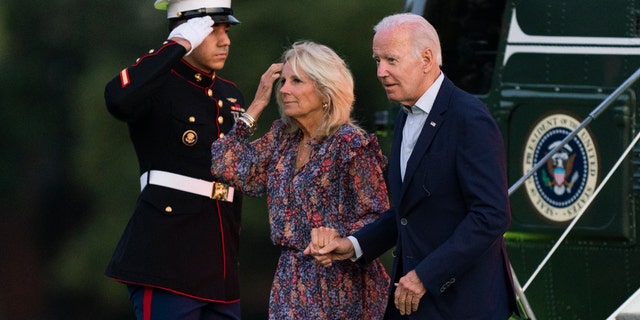Biden to sign bipartisan burn pits legislation designed to support veterans
President Biden will sign bipartisan legislation into law on Wednesday aimed at helping military veterans who were exposed to toxic burn pits during their time in service.
Biden will sign the Sergeant First Class Heath Robinson Honoring our Promises to Address Comprehensive Toxics, or PACT Act of 2022 in the East Room of the White House. The bill is expected to assist more than 5 million veterans exposed to toxic burn pits.
He will be introduced by Danielle Robinson and Brielle Robinson, the surviving wife and daughter of Sergeant First Class Heath Robinson after whom the bill is named. Heath Robinson is a decorated combat medic who died from a rare form of lung cancer.
The PACT Act will expand eligibility for Veterans Affairs health care, make it easier for military veterans to qualify for VA services, strengthen toxic exposure research and improve care for veterans exposed to toxins. Eligible veterans, their families, caregivers and survivors can apply for PACT Act benefits.
SENATE PASSES BURN PITS LEGISLATION AFTER PARTISAN IMBROGLIO
The president had called on U.S. lawmakers to work on burn pits legislation during his first State of the Union address earlier this year.

The bill recently passed both chambers of Congress with bipartisan support. Biden vowed to swiftly sign it into law, saying the burn pits issue is personal for himself and his family.
“When they came home, many of the fittest and best-trained warriors we’ve ever had were not the same; headaches, numbness, dizziness, cancer. My son Beau was one of them,” Biden said at a White House event in June.
BIDEN PUSHES BACK SIGNING BURN PITS BILL AFTER REPUBLICANS TOOK HEAT FOR DELAY
Burn pits have been used by the military to remove household trash, as well as more toxic substances, including paint, metals, plastics and human waste. The fires burned toxic chemicals and were often close to areas in which service members lived and worked while overseas.

The attendees for Biden’s signing include toxic exposed veterans and their families, advocates, administration officials, members of Congress and Veterans Affairs staff who have worked on the issue.
Read the full article Here


